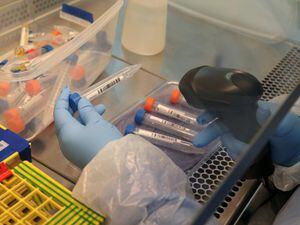We can't end lockdown too early, warns expert.
Easing lockdown "too quickly" could lead to more Covid-19 variants and new surges in infection, an expert warned today.

Microbiologist Dr Arthur Hosie, of Staffordshire University, called for caution in light of the South African variant found in the Black Country and other areas in the UK.
His comments come as a West Midlands study, by Warwick University, warns us to expect another wave of the virus next winter.
Dr Hosie described the virus variant – responsible for almost 150 confirmed Covid-19 cases – as a "concern". He warned easing current lockdown measures whilst cases were still high would lead to virus replication and could lead to new variants.
He said: "When it is clear a variant has entered a new region, such as the South Africa variant entering the UK, we need to do all we can to limit its spread within the population. This needs rapid testing, and incentives to isolate to prevent the spread.
"The Government response to the South Africa variant was too slow and limited and as a consequence, we have more than 147 known cases of this variant in the UK – this is a concern.
"We need to implement all public health measures to avoid these being transmitted and increasing and the current discussion about lockdown easing is concerning."
Prime Minister Boris Johnson said the soonest restrictions could be eased is on March 8, but has promised a "route map" by the end of this month.
Dr Hosie said virus levels were falling, but were still far too high to relax measures. Levels in the West Midlands are currently the highest in the country.
He added: "There is still a lot of new cases daily in the UK. This is a lot of virus replication that gives opportunities to allow new variants to arise. In order to replicate, viruses need to be transmitted to new hosts.
"By using social distancing and other containment measures, we can decrease the case numbers and decrease the opportunities for change.
"The lockdown has brought the case numbers gradually lower. But at a rate that means that if they are eased in March too quickly, it is likely there will be a surge in case numbers and potentially a need for a further lockdown.
"To avoid this, it would be better to keep restrictions for longer, ideally until case numbers are below 1,000 in the UK, the lower the better. Then gradually we can ease restrictions."
Warwick University experts have studied the effects of the vaccine on transmission rates. They say the rate of roll-out of the jab is unlikely to be quick enough to prevent a new wave of the virus next winter, although those falling seriously ill are likely to be those who have not had the vaccine.
Complications
The South African variant of the virus has been found in Walsall as well as parts of the North West. And the Kent variant is now believed to be the dominant form of the illness across the UK.
With talk of a Brazilian variant also around, it can be a confusing and worrying picture.
Dr Hosie today said it is a normal process for a virus, but that it does lead to complications when it comes to efforts to fight Covid and also when looking to relax lockdown measures.
He explained it was a case of "survival and increase of the fittest – evolution in practice" and added: "The coronavirus has an RNA genome and during the process of replication, making more copies of the virus, it needs to make more copies of the genome.
"The process of RNA replication can sometimes make errors and these errors are mutations – the mistakes happen at random and therefore, due to basic probabilities, the more virus replication that occurs, the more likely any specific mutation will arise.
"This is relevant in terms of variant emergence as the large amount of Covid-19 cases in the UK and South Africa have given a greater opportunity to arise.
"The variants, such as the South Africa and UK variants do not only have a single mutation, but numerous – hence we term them variants rather than mutants.
"When mutations arise, the consequences are partly dependent on selective pressure. If there is a change that gives a competitive advantage, then this will cause that specific variant to increase in number and dominate the virus population.
"For example, the UK variant enables greater transmission, which benefits the virus numbers, so this has become dominant. The South Africa variant perhaps allows it to overcome the immune response in previously infected individuals. These mutations cause this as the changes in the genome, the message, are translated into changes in the virus proteins, its structure. The variants of concern have mutations in the spike protein message that changes the spike protein structure."
Questions have been raised about how will it impact vaccination. Recent studies have shown the Oxford-AstraZeneca vaccine offered "minimal protection" against mild and moderate cases of the South African variant. Experts, however, are hopeful it will still be effective at preventing severe cases. And the World Health Organisation this week said countries facing the variant should still use the Oxford vaccine.
Dr Hosie explained: "The immune system primarily recognises the spike protein of the coronavirus and stimulates a protective immune response to it to combat infections.
"If there is sufficient changes to the structure of the spike protein, then an immune response may not recognise and protect against infections with variants with this change.
This is especially true when there are changes in the part of the spike protein that interacts with the ACE2 receptor on host cells. The immune response works in part by preventing the spike:ACE2 interaction. If it cannot interrupt this, then the immune response may be insufficient.
"With regards to vaccination, the Covid-19 vaccine all contain in part a spike protein component or a mRNA that will encode the spike protein in recipients – they work by stimulating a protective immune response to the spike protein in these vaccines.
"If the spike protein in natural coronavirus infections is sufficiently similar, the vaccinated patient will be protected against infections with this coronavirus.
"The worry is that the variants may be sufficiently different to escape this immune response and may therefore cause infection, potentially severe disease. However, there is evidence that the current vaccines will protect at least in part against infection with the known variants."





